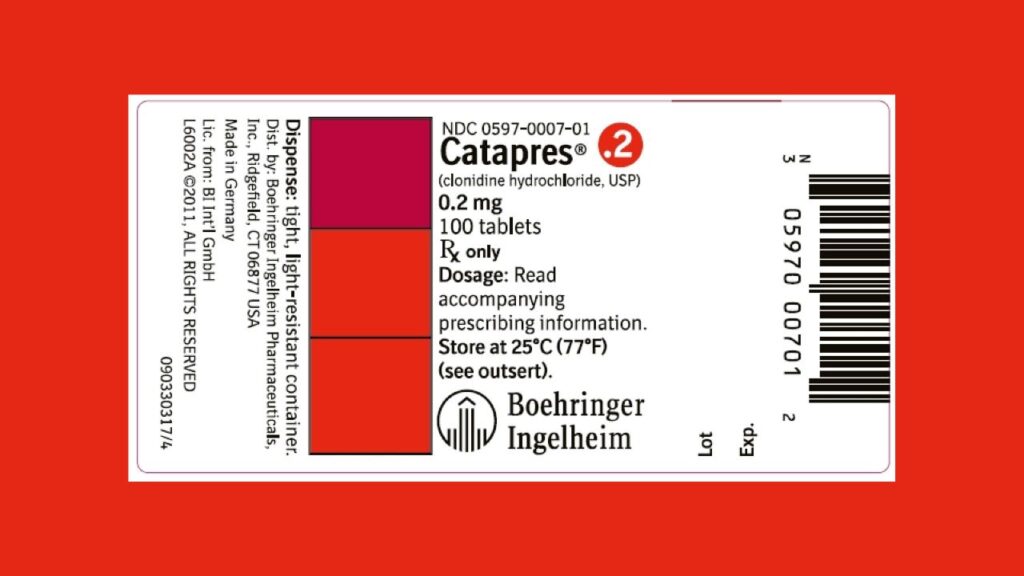Clonidine, sold under the brand name Catapres among others, is a prescription medication used to treat a variety of conditions, including high blood pressure, attention deficit hyperactivity disorder (ADHD), anxiety disorders, migraine, menopausal flushing, diarrhea, and certain pain conditions. As a centrally-acting α2 adrenergic agonist, clonidine works by relaxing blood vessels, decreasing heart rate, and decreasing blood pressure. Despite its accepted medical uses, there are still questions surrounding clonidine’s potential for addiction and abuse.
Properties and Effects of Clonidine
Clonidine is available in various forms, including tablets, transdermal patches, and epidural injections. When taken orally, effects typically begin within 30-60 minutes and last for 6-10 hours. Transdermal patches deliver the medication continuously over several days. Common side effects of clonidine include dry mouth, drowsiness, dizziness, constipation, and sedation.
While clonidine is not a controlled substance, it does have depressant effects on the central nervous system, similar to other sedatives. It lowers blood pressure and heart rate and can cause respiratory depression in high doses. Mixing clonidine with other CNS depressants, such as alcohol, opioids, or benzodiazepines, can dangerously enhance these effects.
Mechanism of Action
Clonidine works by stimulating α2 adrenergic receptors in the brain, which reduces sympathetic nervous system activity. This leads to decreased blood pressure, heart rate, and anxiety. Clonidine also has analgesic effects by modulating pain signaling in the spinal cord and brain.
In the treatment of ADHD, clonidine is believed to improve symptoms by increasing norepinephrine levels in the prefrontal cortex, which enhances attention and reduces impulsivity. However, its exact mechanism of action in ADHD is not fully understood.
Is Clonidine Addictive?
Clonidine itself is not considered to be physically addictive and has a low potential for abuse when used as directed. Unlike other prescription drugs such as opioids or benzodiazepines, clonidine does not cause euphoria, cravings, or addictive behaviors. However, some individuals may develop a psychological dependence on clonidine, especially when using it to self-medicate for conditions like insomnia or anxiety.
Clonidine Withdrawal and Rebound Hypertension
One of the main concerns with clonidine use is the potential for withdrawal symptoms and rebound hypertension. Clonidine withdrawal can occur if high doses are stopped abruptly after prolonged use. Symptoms may include nervousness, agitation, headache, and tremor. In severe cases, suddenly stopping clonidine can lead to rebound hypertension, where blood pressure increases to dangerously high levels. This rebound effect may compel some patients to continue taking clonidine to avoid uncomfortable and potentially dangerous withdrawal symptoms. To minimize the risk of withdrawal and rebound hypertension, clonidine should always be tapered off gradually under medical supervision.

Signs and Symptoms of Clonidine Abuse
While clonidine abuse is rare, it is essential to recognize the signs and symptoms of misuse. These may include:
- Taking higher doses than prescribed
- Taking clonidine more frequently than directed
- Using clonidine without a valid prescription or medical need
- Combining clonidine with alcohol or other drugs
- Exhibiting excessive sedation, confusion, or respiratory depression
- Continuing to use clonidine despite negative consequences
- Unable to stop using clonidine even if they want to
- Needing higher doses to achieve desired effects (tolerance)
- Going through withdrawal when stopping clonidine
Clonidine Overdose
Although rare, clonidine overdose can occur, especially when combined with other CNS depressants. Symptoms of a clonidine overdose include very low blood pressure, weak pulse, slow or shallow breathing, dizziness, small pupils, and loss of consciousness. A clonidine overdose is a medical emergency that requires immediate treatment to prevent life-threatening complications.
Treatment for Clonidine Addiction
While clonidine addiction is uncommon, some individuals may develop problematic patterns of use that require professional treatment. This is particularly true if they are taking clonidine to self-treat a mental health disorder or misusing it in combination with other substances. Treatment for clonidine addiction focuses on gradually tapering the patient off the medication, managing any withdrawal symptoms that arise, and addressing the underlying issues that led to the clonidine abuse.
Comprehensive Addiction Treatment at JourneyPure At The River
At JourneyPure At The River, we provide comprehensive, evidence-based treatment for prescription drug addiction and co-occurring mental health disorders. Our compassionate team of doctors, nurses, therapists, and counselors are dedicated to helping you achieve a full recovery and get your life back on track. Our personalized treatment plans may include:
- Medically supervised detox and withdrawal management
- Individual and group therapy
- Cognitive-behavioral therapy (CBT)
- Dialectical behavior therapy (DBT)
- Medication-assisted treatment (MAT)
- Dual diagnosis treatment for co-occurring mental health disorders
- Holistic therapies such as yoga, meditation, and art therapy
- Aftercare planning and support
If you or a loved one is struggling with clonidine abuse or addiction, don’t wait to seek help. Call JourneyPure At The River today at 629-222-9449 to learn more about our programs and start your journey to lasting recovery. Our admissions team is available 24/7 to answer your questions and help you take the first step toward a healthier, substance-free life.
